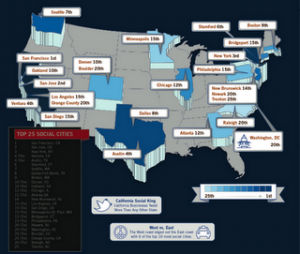Cities Using Social Media to Generate Buzz — and Revenue
, Posted in: Inspiration, Author: nleavitt (September 25, 2011)
 Municipalities nationwide continue to lose millions of dollars in sales tax receipts due to slower retail sales. The City of Vallejo, CA filed for bankruptcy in 2008, a victim of the real estate crash.
Municipalities nationwide continue to lose millions of dollars in sales tax receipts due to slower retail sales. The City of Vallejo, CA filed for bankruptcy in 2008, a victim of the real estate crash.
Four hundred miles south in Orange County, CA, municipalities are getting whacked by having considerably less revenue and the growing realization that they can’t afford public pension liabilities. The California Independent Voter Network recently reported that in 2009-2010, 23 Orange County cities outspent their general fund reserves. Translation: Most of these cities have not only slashed their budgets, but may also have to go into reserves, perhaps even borrow and cut services.
It’s enough to make a city manager’s hair go prematurely gray – or experience some sleepless nights before the weekly city council meeting – or both.
But a solution may be just a few clicks away. More and more cities around the U.S. are jumping on board the social media bandwagon and utilizing various tools/programs to not only be able to provide time-sensitive material as quickly as possible (e.g., emergency info, usually via Twitter), but to market/promote their fair city to the widest possible audience.
NetProspex, a B2B sales/marketing contact database company, rolled out last month its 2011 Summer Social Business Report. One section of the report focused on ranking the top 25 U.S. cities for social media usage by businesspeople. The report was developed by analyzing what NetProspex said were “verified business contacts in its crowd-sourced database; 12 million employees at U.S.-based businesses were analyzed for Twitter, Facebook and LinkedIn activity.”
Not going to list all 25 but here’s their Top 10 list: San Francisco; San Jose; New York; Ventura, CA and Austin (tied for 4th); Stamford, CT; Seattle, Dallas-Ft. Worth; Boston; and Denver and Oakland (tied for 10th).
So how are some cities using social media? Not surprisingly, even small-to-medium sized municipalities are finding that a properly orchestrated campaign can yield significant rewards:
The City of Tomball, TX, 28 miles northwest of Houston, was founded in 1907 by Texas State Senator Thomas Henry Ball (hence ‘Tomball’). The town was initially established as a railroad center for transporting agricultural products.
The city recently hired its first marketing director, Mike Baxter, who worked in the tourism industry for 30+ years. Baxter created a Tomball, TX page on Facebook that provides updates on things to see/do in the city and in nearby communities. Daily updates include food dishes offered by area restaurants, even where to shop for gifts for guys. A Flickr account was also launched, enabling visitors to see digital pictures of Tomball. Baxter has also posted videos that feature slide photos from city shops and events held — all posted under the ‘Tomball1907’ account name with the city’s slogan, “Tomball…Texan for Fun!”
The social media programs are generating buzz and revenue, notes Baxter.
“Tourism dollars don’t just affect a festival,” said Baxter. “Money is spent in town at hotels and at restaurants and even further down the line at the gas station and tourists may stop at a convenience store or the local grocery store.”
Quite a few metro Atlanta cities are now using social media – everything from tweeting to webcasting. Two of them are Decatur and Suwanee. Decatur established a blog way back in 2008; that morphed to include Twitter and Facebook pages. Decatur today regularly partners with the Georgia Municipal Association to conduct social media workshops on the city’s site, and last year added an online component for the city’s 10-year strategic plan.
“We wanted a component for people who wanted to attend meetings but couldn’t,” said Linda Harris, assistant director for community and economic development.
Suwanee started a Facebook page in 2009 and uses it to promote/announce open houses, public meetings, even art shows. Last year, the Atlanta Regional Commission gave the city an award for technology innovation.
Two more examples – Boston has a number of iPhone apps to streamline government bureaucracy. Citizens can use them to report potholes, graffiti, downed power lines, and more, to City Hall. After filing the complaint, users get a tracking number so they can monitor if the job’s getting done.
Mashable reported that in 2010 the City of Orlando, FL was trying to get a New York City-based company to relocate. The Metro Orlando Economic Development Commission launched a microsite that also included YouTube and Flickr links. Facebook and Twitter city pages included testimonials and stories about why residents and businesses loved living/working in Orlando. An e-newsletter waxed eloquent about Orlando’s attributes.
Unfortunately, the company never moved south but the campaign helped in rebranding efforts and many of the social media elements continue to be used for recruiting purposes.
Social media isn’t designed to be a complete economic panacea for municipalities. But implementing targeted campaigns and utilizing available tools and programs germane for your city can be an important first step.
Comments